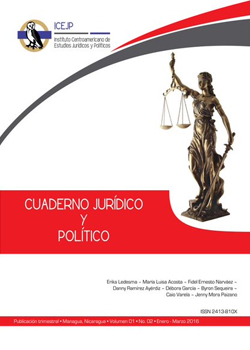Women's empowerment of maquila
Reflection from a formative experience
DOI:
https://doi.org/10.5377/cuadernojurypol.v1i2.10990Keywords:
Gender, workers in the maquila, empowerment, labor rights, equalityAbstract
Gender studies at universities contribute to raising awareness about the conditions of women, from the binary patterns of relationships in culture and social development. This awakening of conscience is a sign of the emancipation processes and curricular promotion that contribute to enhancing the knowledge generated by agents of cultural production and from non-binary logics, among which women have their position. The Polytechnic University of Nicaragua has several training initiatives with different focused axes; one of these is about the empowerment of working women through the Central Institute of Legal and Political Studies, ICEJP - UPOLI.
Downloads
216


 Cuaderno Jurídico y Político es de acceso abierto y permite la reproducción, la distribución y la comunicación pública solo para fines no comerciales
Cuaderno Jurídico y Político es de acceso abierto y permite la reproducción, la distribución y la comunicación pública solo para fines no comerciales 